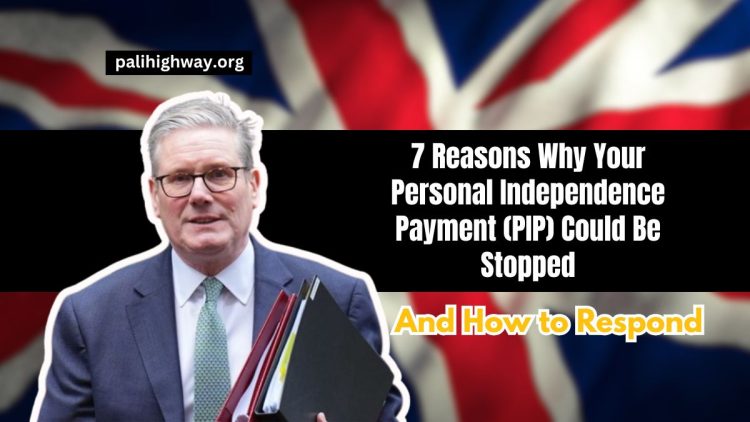Personal Independence Payments (PIP) are vital disability benefits offered by the Department for Work and Pensions (DWP), providing eligible claimants with up to £750 per month.
A reduction or cancellation of these payments can significantly impact individuals, leaving many unsure about the reasons behind such decisions.
In this guide, we will explore the potential reasons why your PIP payments might be suspended or reduced, and how you can address such situations.
Reasons for Suspension or Reduction of PIP Payments
There are several reasons why the DWP may stop or reduce your PIP payments. While these instances are rare, it’s important to be aware of the key factors that could lead to such a decision:
1. End of Fixed-Term Award
If your PIP award was issued for a specific term, the payments may cease once this term ends. The DWP will notify you in advance when this is the case.
2. Failure to Attend Medical Assessment
Your PIP payments may be suspended if you miss a scheduled medical assessment. It’s crucial to attend this appointment, or else your benefit could be affected.
3. Change in Circumstances
A change in your circumstances, which you report to the DWP, could make you ineligible for PIP. This might include changes in your health, living situation, or employment status.
4. Benefit Fraud Allegations
If you are suspected of committing benefit fraud, your payments will be suspended while the DWP conducts an investigation.
5. Immigration Control
If you are under immigration control, you may lose eligibility for PIP, and the payments may stop.
6. Repayment Deductions
In cases where you owe the DWP, the department may deduct part of your PIP payments to repay the debt.
7. Improvement in Your Condition
If a medical assessment determines that your condition has improved, the DWP may reduce or stop your payments based on the outcome.
What to Do if Your PIP is Stopped or Reduced
If your PIP payments have been stopped or reduced, it’s important to take swift action to address the situation.
The DWP typically sends a letter explaining the reasons for the cessation of your benefit. Here’s what to do:
Contact the PIP Enquiry Line
If you’re unclear about why your payments were stopped or reduced, you can contact the PIP enquiry line. This service is free from both mobiles and landlines. They can provide information about your case and guide you through the next steps.
Failure to Return a Review Form
If you missed returning your PIP review form on time, the DWP may reduce or stop your benefit. In such cases, contact the PIP enquiry line immediately to explain your situation and request an extension.
If an extension is not possible, it is essential to start a new PIP claim as soon as possible to avoid losing your benefit.
Missed Medical Assessment
In case you missed your medical assessment, reach out to the enquiry line and request a reschedule.
If the DWP deems you eligible after the rescheduled assessment, any missed payments will be backdated to the original date of suspension.
Mandatory Reconsideration
If your payments are stopped or reduced, you have the right to challenge the decision through a mandatory reconsideration process.
This process must be initiated within a month of the decision. Citizens Advice can provide valuable assistance to help guide you through the mandatory reconsideration process.
Benefit Fraud Investigations
In cases where benefit fraud is suspected, your PIP payments will be suspended while an investigation takes place. If your condition worsens during this period, you can submit a new PIP claim.
Once the investigation concludes and no fraud is found, any missed payments will be backdated to the date they were initially stopped.
How to Ensure Your Payments Continue
To ensure the continuity of your PIP payments, follow these essential steps:
- Return review forms on time to avoid delays.
- Attend scheduled medical assessments to prevent interruptions in your benefits.
- Notify the DWP promptly about any changes in your circumstances.
Common Reasons for PIP Suspension
| Reason | Description |
|---|---|
| Fixed-Term Award Ends | Your award is for a specific period and stops at the end of the term. |
| Missed Medical Assessment | Failure to attend a medical assessment can lead to suspended payments. |
| Change in Circumstances | Reporting a change in circumstances (health, living situation, employment) can make you ineligible. |
| Benefit Fraud Allegations | Payments are suspended during an investigation into alleged fraud. |
| Immigration Control | If under immigration control, you may no longer be eligible for PIP. |
| Owed Repayment | Payments may be deducted if you owe the DWP. |
| Improved Health | If your condition improves, your payments may be reduced or stopped. |
PIP is an essential financial support for individuals with disabilities, but certain circumstances can lead to its suspension or reduction. Understanding the potential reasons for these changes and taking the necessary actions can help you regain or maintain your benefits.
Always ensure timely communication with the DWP, attend medical assessments, and report any changes in your circumstances to avoid disruptions in your payments.
FAQs
What should I do if my PIP payments stop?
If your PIP payments stop, immediately contact the PIP enquiry line to understand the reasons. You may need to return a review form, reschedule a medical assessment, or appeal the decision through mandatory reconsideration.
Can I receive backdated payments if I miss a medical assessment?
Yes, if your PIP payments are suspended due to a missed medical assessment and you are later deemed eligible, any missed payments will be backdated to when they were initially stopped.
How do I challenge a PIP decision?
If your PIP payments are stopped or reduced, you can challenge the decision through mandatory reconsideration. This must be done within a month of receiving the decision. Seeking advice from organizations like Citizens Advice can be helpful.

